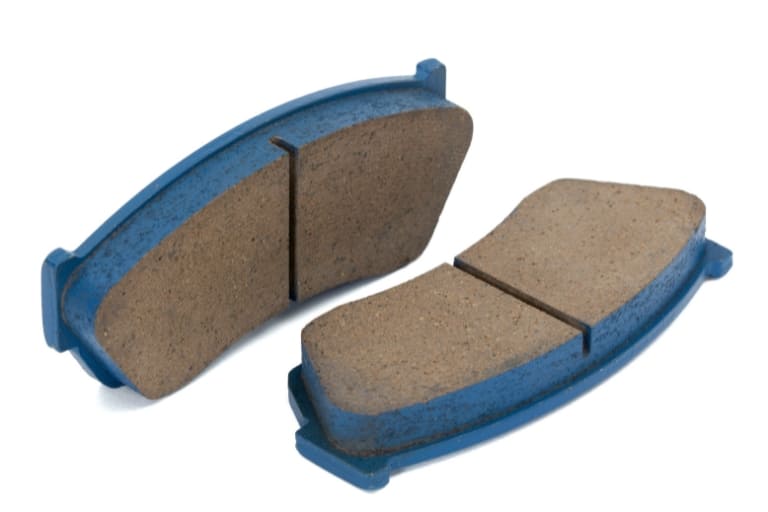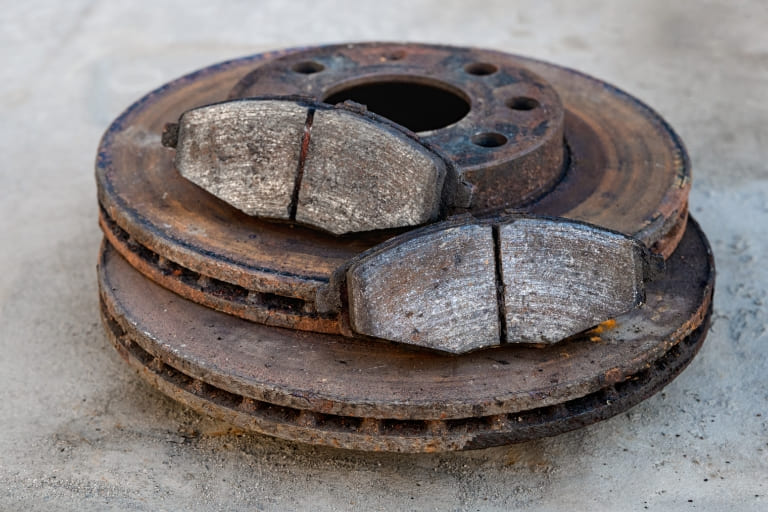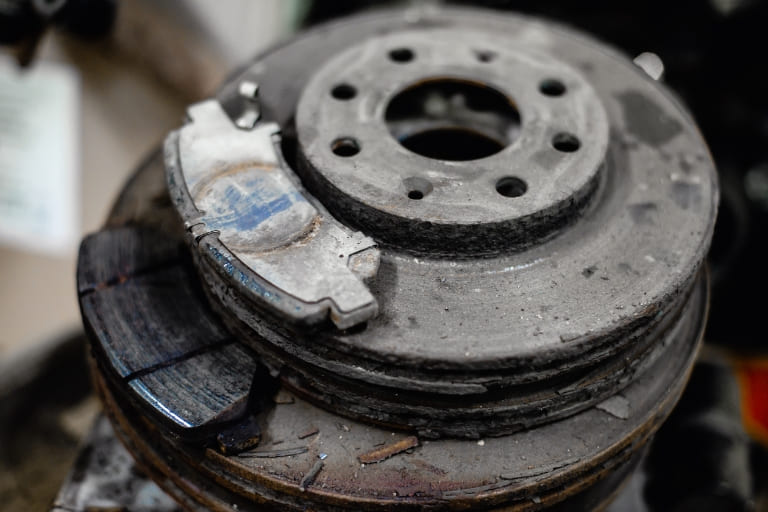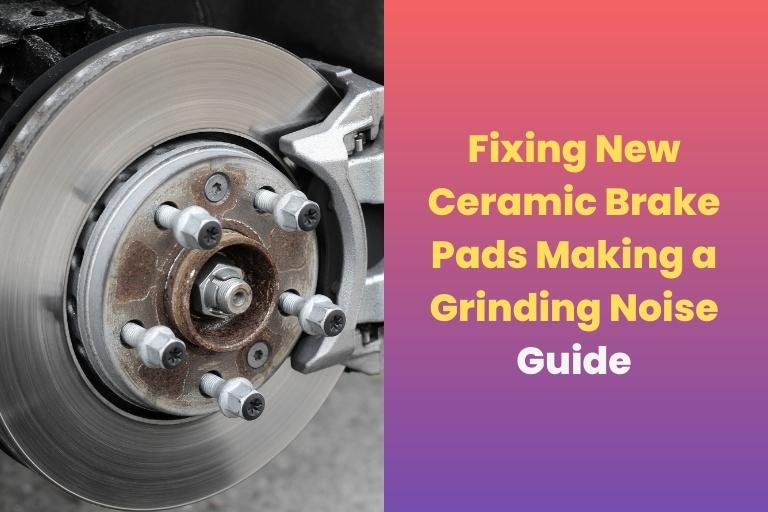If you have just replaced your brake pads and they are producing noise, there might be various causes. One possibility is that you used the incorrect type of brake pads or that they were not properly mounted.
Ceramic brake pads are one type of brake pad you may use on your car. They are constructed from ceramic fibers, bonding chemicals, and nonferrous fillers. Compared to other brake pads, ceramic brake pads are noted for their longevity, high heat tolerance, and low noise levels.
In this blog, we will go through the cause and answer why you hear brake caliper noise on new brakes. We will also list a few causes of grinding brake noise on ceramic pads and how to fix this issue. We will try our best to answer all the questions about this topic. So, let us get started!
Contents
Why Do You Hear Brake Caliper Noise On New Brakes?
There are various possible causes for new brake sounds. Excessive wetness, increased heat, or a regular break-in time are all frequent causes.
Another possibility is that you inserted low-quality brake pads, which are producing the noise. However, a blocked caliper or worn-out rotors are also probable culprits.
What Causes Grinding Brake Noise On Ceramic Pads

There are many reasons that can cause grinding noise on ceramic pads. A few of them are listed and explained below:
Bedding-In Process
The bedding-in procedure is important when installing new ceramic brake pads to ensure maximum braking performance. During this operation, a modest quantity of material is moved from the brake pad to the rotor.
This transfer procedure might cause a grinding noise, which is quite normal and usually goes away after a few hundred kilometers.
Rust on the Rotor Surface

If your automobile is stored for an extended period of time, the rotor surface may rust. You may hear a grinding noise when you first use your brakes after this rust has accumulated. However, after a few stops, this noise should go away.
Low-Quality Ceramic Brake Pads
Even after bedding in, low-quality ceramic brake pads might make a grinding noise. This noise might be caused by low-quality materials or a flawed production technique.
To avoid any safety issues, it is vital to replace your brake pads as soon as you suspect they are of poor quality.
Glazing
Glazing occurs when the brake pad material becomes excessively hot, resulting in a covering of melted material on the brake pad’s surface. This layer may make a grinding sound when the brakes are used.
Glazing can occur due to harsh braking or poor brake pad bedding-in. In severe circumstances, the glazing might limit the efficiency of the brake pad, necessitating replacement.
Worn Brake Pads
If your brake pads are worn, you may hear a grinding sound. The metal backing of the brake pad is grinding on the rotor, causing this noise. In this instance, replacing the brake pads is critical to preventing further damage to the braking system.
Rotor Damage
If brake pads are not correctly installed or are of poor quality, they may cause damage to the rotor’s surface. As a result of this damage, the brakes may create a grinding sound when applied. The rotor may need to be replaced in extreme circumstances.
Stuck Brake Caliper
When a brake caliper is jammed shut, the brake pads may stay in contact with the rotor even when the brakes are turned off. Because of the frequent contact, the brake pads can wear down fast and make a grinding noise.
This issue must be rectified as soon as possible in order to prevent further damage to the brake system.
Loose Brake Pad
When a brake pad gets loose, it may move about in the caliper, making a grinding noise when applied. This issue might be caused by a worn-out or damaged brake pad retention clip, which holds the brake pad in place.
How To Fix Ceramic Brake Pad Making Grinding Noise?

If your new ceramic brake pads make a grinding noise, you must act swiftly to guarantee safe driving and avoid further braking system damage.
If your new ceramic brake pads are generating a grinding noise, try the following four steps:
Step 1: Identify the Cause
The first step in fixing the problem is determining the source of the grinding noise. One of the eight factors mentioned in this debate might be the culprit.
This includes rotor surface corrosion, poor brake pad quality, glazing, worn brake pads, rotor damage, a jammed brake caliper, or a loose brake pad.
Step 2: Examine and clean the braking system
Once you’ve determined the source of the noise, you must properly check and clean the braking system. This involves looking for wear, damage, or contamination on the brake pads, rotor, and calipers.
Remove any corrosion or dirt from the rotor surface and check the alignment of the brake pads.
Step 3: Replace Damaged Components
If any components are found damaged, such as worn brake pads, broken rotors, or a jammed brake caliper, they must be replaced immediately.
Step 4: Re-Bed the Brake Pads
If the grinding noise is rendered by faulty brake pad bedding-in, it is necessary to appropriately re-bed the brake pads. Use the manufacturer’s suggested procedure to guarantee excellent brake performance and limit the danger of future grinding sounds.
Why Do New Brakes Grind At A Complete Stop?
There are various reasons why new brakes may make a grinding noise while coming to a halt.
Rust
When brake pads sit for a lengthy period of time, they can rust and cause noise. However, this is a regular phenomenon that generally resolves itself shortly.
Metallurgy
When the surface of a brake pad has tighter fibers than the remainder of the pad, it may produce a grinding or screaming sound until it wears down.
Poor lubrication
Adequate lubrication is essential where brake pads and calipers join to avoid vibration, which can produce noise.
Other worn-out parts
Cheap or low-quality brake pads may produce loud grinding noises and other problems. It is advisable to invest in high-quality brake pads that give superior stopping power, last longer, and make less noise.
Can you Drive With Grinding Brakes?
Driving with your brakes grinding is not recommended. Grinding brakes are vital to understand since they signify a severe mechanical problem. Noise is frequently produced by worn brake pads, and worn brake pads harm rotors, which cost more to repair than pads.
Frequently Asked Questions
How much does fixing grinding noise from brake pads cost?
Repairing grinding brakes should cost between $200 and $300. However, it is crucial to remember that most of the repair expenses for brake grinding are labor-intensive, and if you can do it yourself, you may save a lot of money. The cost of repairing a brake might vary since the brake has several causes to make a grinding sound. It will cost you between $50 and $200 to replace the brake pads on your car if you do it yourself.
How long can you drive with worn-out brake pads?
You should not drive for a lengthy period of time with worn brake pads. Driving with worn brake pads can cause significant damage to the brakes and reduce their effectiveness. It can potentially result in total braking failure. Even if you don’t have a brake failure, worn brake pads can cause a longer stopping distance and make the road dangerous for you and other vehicles.
Do new ceramic brake pads make noise?
Ceramic brake pads are quiet because they generate no noise or dust when applied. Furthermore, they are more tough and long-lasting than traditional brake pads.
How do you quiet down ceramic brake pads?
If your brakes make a lot of noise when you press down on the pedal, here are some typical ways to keep them quiet:
- Lubricate the Brake Pads
- Brake Pad Shims should be installed.
- Replace the brake pads and rotors.
You may also get your car examined by a mechanic.
Also, Read:
- How Close Should Brake Pads Be To Rotors?
- Can You Spray Brake Cleaner On Brake Pads? Does It Help?
- Can You Put Brake Pads On Backward? Why Should You Avoid?
- Brake Shudder After New Rotors And Pads? Here Is The Fix
- Are Brake Pads Interchangeable? Let’s Find Out
- Does The Emergency Brake Lock All Wheels?
- How Long Can You Drive On Grinding Brakes?
- Do Ceramic Brake Pads Contain Asbestos?
- Can You Use Front Brake Pads On The Rear?
- Why Does My Car Shake After Changing the Brake Pads?
- Should You Replace All 4 Brake Pads At Once?
- How to Install Anti-Rattle Clips on Brake Pads: Beginner’s Guide
- How Long Do Brake Pads Last: Brake Pad Lifespan Explained
- Driving Without Brake Pads: How Long is Safe?
- Ceramic vs. Semi-Metallic Brake Pads: Which is Better?
- Why Are My Brakes Grinding After New Pads And Rotors
- Ceramic vs OEM brake pads
- Ceramic vs Organic Brake Pads: In-depth Comparison
- Ceramic vs Carbon Fiber Brake Pads: A Comprehensive Comparison
Conclusion
In conclusion, hearing a grinding noise from your new ceramic brake pads can be aggravating and alarming. This problem can be caused by a number of causes, including faulty installation, rotor surface corrosion, low-quality brake pads, glazing, worn brake pads, rotor damage, stuck brake calipers, or loose brake pads.
To protect your safety while driving, you must fix the issue as soon as possible. Check your pad installation, clear dirt from the pad and rotor, or reposition the caliper to resolve the issue.
There are various other reasons why new brakes may grind to a halt, including rust, metallurgy, insufficient lubrication, low-quality brakes, or other worn-out parts.
It’s important to inspect your car by a professional to resolve the problem and avoid driving with grinding brakes, which can cause more damage and threaten the safety of you and other road users.
